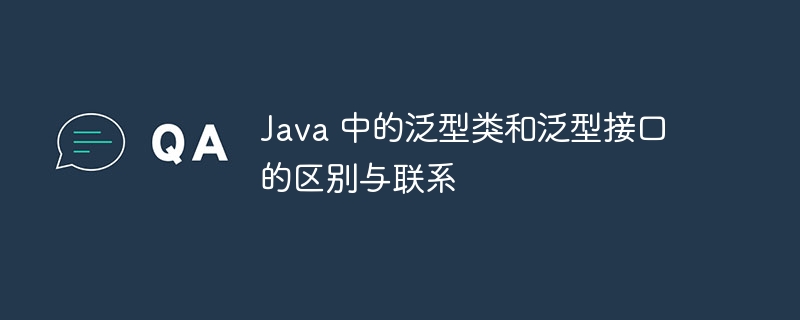
The difference between a generic class and an interface is that a generic class creates an object, declares data members, and is an extensible class; a generic interface declares methods, has no data members, and can only extend the interface. How they're related: Both allow you to create code that works with multiple types and check for type safety.

The difference and connection between generic classes and generic interfaces in Java
Generic classes
Generic classes allow you to create classes with type parameters so that you can operate on various types of data. Generic classes are declared by following the class name with angle brackets<>and the type parameters. For example:
class MyGenericClass{ private T value; // ... 省略其他代码 }
Generic classes can be used with any type, just like non-generic classes. However, generic classes check the type safety of type parameters at compile time.
Generic Interface
Generic interfaces are similar to generic classes, but they declare interfaces instead of classes. Generic interfaces allow you to create interfaces with type parameters that can be used with various types of data. Generic interfaces are declared by following the interface name with angle brackets<>and the type parameters. For example:
interface MyGenericInterface{ T getValue(); void setValue(T value); }
Generic interfaces can be used with any type, just like non-generic interfaces. However, generic interfaces also check the type safety of type parameters at compile time.
Difference
The main difference between generic classes and generic interfaces is:
Contact
Generic classes and generic interfaces have the following in common:
Practical case
The following is an example of using generic classes and generic interfaces:
public class Main { public static void printList(List list) { for (T item : list) { System.out.println(item); } } public static void main(String[] args) { List list1 = new ArrayList<>(); list1.add("Hello"); list1.add("World"); printList(list1); } }
In this example, # The ##printListmethod is a generic method that can be used with any type of list. The method's type parameterTallows the method to accept a list with elements of any type. Due to type safety checks for type parameters, methods can only be passed in lists, not collections of other types.
The above is the detailed content of The difference and connection between generic classes and generic interfaces in Java. For more information, please follow other related articles on the PHP Chinese website!




